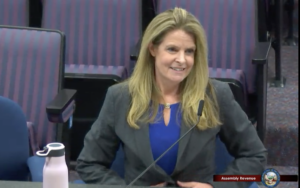5:00
News Story
Who wants to have a conversation on corporate landlords (and the taxes they do or don’t pay)?
A Nevada assemblywoman aims to find out
5:00
News Story
Who wants to have a conversation on corporate landlords (and the taxes they do or don’t pay)?
A Nevada assemblywoman aims to find out
Real Estate Investment Trusts are singled out for an exemption in the state commerce tax. “My issue is equity,” says Assemblywoman Venicia Considine. “It is unfair for landlords of businesses in group A to pay the commerce tax but not group B.” (Getty Images)
Real Estate Investment Trusts are singled out for an exemption in the state commerce tax. “My issue is equity,” says Assemblywoman Venicia Considine. “It is unfair for landlords of businesses in group A to pay the commerce tax but not group B.” (Getty Images)
If you are a renter, who owns your home? Who owns the advertising billboard you pass everyday on your commute to work? Who owns the casino where the event advertised on that billboard is happening? Who owns the office complex where you work?
Increasingly, the answer in Nevada is a real estate investment trust, or REIT.
REITs are companies that own income-producing real estate, typically through rent payments but also through interest on mortgages they finance. Similar to mutual funds, REITs are required to payout most of their income as dividends to their shareholders, of which there typically must be at least 100.
Megadeals involving Las Vegas Strip properties are the most high-profile example of REITs making their mark in Nevada, but REITs are not limited to any one industry. Nationally, they have received the most attention for buying up significant swaths of single-family homes and rental units, which critics say drives up the mortgages and rents for non-investors who are simply looking to buy and live in a home.
Assemblywoman Venicia Considine (D-Las Vegas) wants Nevada to start a conversation about REITs — not just about their influence in key industries like housing, but also about the state’s approach to taxing them.
At the federal level, REITs are sheltered from paying corporate income tax because their earnings are distributed to shareholders as dividends. For shareholders, the majority of those dividends are taxed as ordinary income, though some fall under capital gains, according to Nareit, the National Association of REITs.
Michael Mazerov, a senior fellow at the Center on Budget and Policy Priorities, said exempting REITs from corporate tax is understandable at the federal level because that revenue is still captured from individuals as part of income tax.
“States generally cannot do that,” said Mazerov, because most REIT shareholders will be located in other states. “It doesn’t make sense for any state, in my opinion, to conform to federal REIT status.”
A few states have tackled REITs at their level.
New Hampshire is one of them. The Granite State, which has no personal income tax but does have a corporate income tax, does not exempt REITs from its corporate income tax.
Various Hawaii legislators, driven by the realization that their hotels and retail centers were owned by REITs on the mainland, in recent years have attempted to adjust the state’s tax structure for REITs. But those efforts were derailed in the legislature or vetoed by the governor.
Nevada with its conspicuous lack of both corporate and personal income tax doesn’t have that obvious avenue before it.
A curious commerce tax exemption
Considine is sponsoring Assembly Bill 345, which would remove from the commerce tax statute an exemption for REITs. That exemption was written into the 2015 bill, championed by then-Gov. Brian Sandoval, authorizing the commerce tax, which for real estate businesses is a quarter of a percent on all gross revenue above $4 million.
Considine, who is serving her second term in the Legislature, told the Assembly Committee on Revenue during a March 30 hearing that she could not find any legislative record explaining why the exemption was included.
“My issue is equity,” she told the committee, which she co-chairs. “It is unfair for landlords of businesses in group A to pay the commerce tax but not group B.”
That sentiment aside, it is unclear whether that is actually happening, because the wording of the existing statute suggests it applies only to REITs without direct holdings. Put another way, there’s an exemption to the exemption, and most REIT activity would appear to fall under the non-exempted category.
“I’ve been told they do pay commerce tax,” Considine acknowledged in an interview with the Current. “I think it’s a tangled web. I really want us to dive into it and pull the strings, untie the knot.”
The way she sees it, if the REIT commerce tax exemption is largely moot, there should be no issue with her proposal to simply remove it altogether.
“In the big picture, I really thought having this bill would have people crawling out of the woodwork,” added Considine. “The almost complete silence on this bill just adds to the layers of confusion.”
The Nevada Department of Taxation did not respond to requests for details on which REITs are exempted from the commerce tax.
More than anything, she wants to start a conversation about REITs.

“Let’s put it out there and see the benefit of the exemption. If there is no benefit, then why is it in there? How is it affecting our state, our tax base and our population?”
She continued, “I know the benefits to the shareholders. But what are the benefits to our community?”
At least one lawmaker across the aisle was receptive to that conversation. State Assemblywoman Danielle Gallant (R-Las Vegas), a real estate broker, thanked Considine for introducing the bill and said REITs are pushing Nevadans out of the real estate market.
“They are making it harder for people to get into their first or second homes,” she said.
The revenue panel passed AB 345 out of committee on Tuesday. Three of the committee’s four Republicans voted in opposition. Gallant voted for the motion but noted that she and Considine were “working on some possible amendments to make it more palatable, so to speak.”
A much more obvious tax loophole
REITs have been a major beneficiary of a tax loophole that Nevada lawmakers are considering closing this session.
That loophole involves the real estate transfer tax and an existing exemption for deals involving transfers of property from one owner to a subsidiary. A Las Vegas Review-Journal investigation last year found that since 2007 at least $27.5 billion worth of transactions — most of them on or near the Strip, and many involving real estate investment trusts — avoiding paying the real estate transfer tax. Essentially, instead of selling a property to a buyer directly, a company would transfer their property to a newly formed subsidiary, qualifying them for the real estate transfer tax exemption, then the second company would purchase the subsidiary.
Considine introduced a bill, Assembly Bill 450, to close that loophole. Assembly Speaker Steve Yeager and Assemblywoman Sandra Jauragui independently introduced a similar bill, Assembly Bill 448.
“I don’t think anyone is violating the law,” Yeager emphasized Thursday in an Assembly Revenue hearing for his bill. “I think there is a loophole.”
The real estate transfer tax helps fund affordable housing trusts, the building of new schools in Clark County and general funds for the state and Washoe and Churchill counties.
According to Yeager, the real estate transfer tax generated $248.6 million in fiscal year 2021. That included $44 million to fund capital projects within Clark County School District and $10.4 million for affordable housing.
“When transfer tax isn’t paid, that’s a real hit. Not just to the general fund that we care about in this building but to school districts and affordable housing.”
Nevada and REITs
Considine in her commerce tax presentation did not single out any single REIT or economic industry, but there is a clear indication that Nevada has welcomed REITs with open arms: the real estate investment trusts that control a significant portion of the largest properties on the Las Vegas Strip.
Caesars Entertainment announced its intent to form a REIT in 2014 SEC filings amid its complicated bankruptcy proceedings. The bankruptcy, completed in 2017, resulted in Caesars spinning its physical assets off to an independent, newly formed REIT named VICI Properties.
Meanwhile, MGM Resorts announced the formation of its own REIT, MGM Growth Properties, in October 2015.

Late last year, VICI acquired MGM Growth Properties for $17.2 billion, making it the Strip’s biggest landlord.
That MGM-VICI deal was reported to include $860 million in annual rent for 25 years, with rent rising 2% annually for the first decade and then between 2% and 3% annually depending on the consumer price index thereafter.
Considine told the Current that those deals did not motivate her to introduce her commerce tax bill. During the hearing for AB 345, she did not mention VICI or any of the major REIT deals in recent years.
“That wasn’t my focus,” she said. “I didn’t want anyone to think it was about those properties — the big Strip things. It is about the entire state.”
Considine, an attorney whose legal career started with doing foreclosure work at the Legal Aid Center of Southern Nevada in the immediate aftermath of the housing bubble burst, said her heart is in addressing rental issues.
“I’m very worried about housing,” she said. “If they are buying up our communities and making them rentals instead of allowing for the American Dream, then that’s really what I would like to know more about.”
Considine said REITs are becoming increasingly active, with one REIT-owned master-planned community being designed specifically for rentals. She isn’t the only lawmaker concerned. State Sen. Dina Neal (D-North Las Vegas) independently has introduced Senate Bill 395 to require corporate investors, including REITs, to register with the Nevada Secretary of State’s Securities Division. That bill would also restrict their purchasing ability to 1,000 properties per year.
Corporate investors bought a quarter of all single-family homes nationwide in 2021. In Nevada, investor purchases climbed from 18% in 2020 to 30%, according to a Stateline analysis. Only two states — Georgia and Arizona — saw more action from investors.
REITs own 7,937 properties across Nevada, totalling $78.02 billion in property value, according to Nareit. Those properties include more than 4,600 single-family rentals, 1,100 cell towers, 153 industrial centers, 149 retail centers and 82 health care facilities.
Our stories may be republished online or in print under Creative Commons license CC BY-NC-ND 4.0. We ask that you edit only for style or to shorten, provide proper attribution and link to our website. AP and Getty images may not be republished. Please see our republishing guidelines for use of any other photos and graphics.



